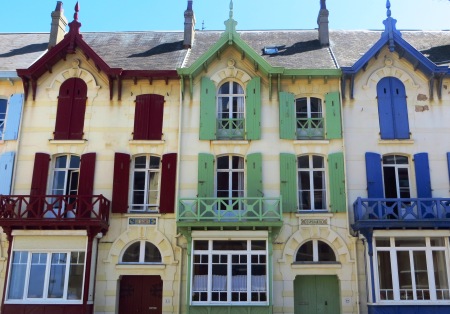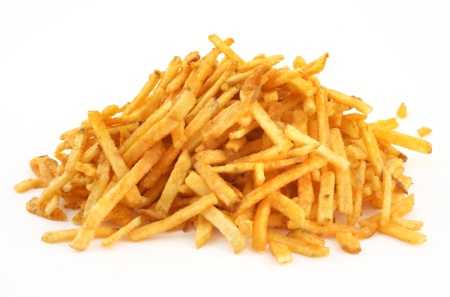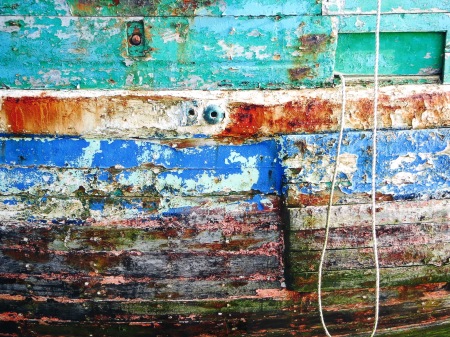Whilst I sat in the sun with a second beer the girls went to find a restaurant for evening meal and after a while came back and declared that they had found the perfect place so we agreed meal plans and walked back to the hotel as the sky blackened and rain clouds raced in.
It rained for an hour or so but had cleared by the time we had agreed to walk out so we sauntered along the sea front to the Le Citrus only to be turned away because it was fully booked all evening. We returned to the restaurant that we had enjoyed the previous evening but the result was the same so worrying that we might have to share the last bag of crisps in our room we went directly back to the hotel where the staff helpfully found us a table regardless of the fact that we hadn’t reserved. Saturday nights in Dinard are busy it seems.
The rain cleared overnight and in the morning there was a clear sky and a dazzling sun rise which shimmered off the surface of the sea and reflected off the chrome decorations on the boats as they swayed lazily on placid water so we planned a day of seaside and promenade walks and shortly after breakfast set off on the first of these.
Strolling along the promenade we came across a lifeguard tournament rather like musical chairs as a series of sand races resulted in an elimination after each round. We got rather excited about the whole thing especially when our favourite competitor from Biarritz, wearing Basque colours of green and red, fought off all challengers to claim first prize
Racing over we continued our walk under a rock promenade with the sea to our right with views across to St Malo and under the shadow of granite cliffs to our left topped by a succession of magnificent houses and villas.
In the late nineteenth century during the show off period of the French Belle Époque, Dinard was discovered and developed by Saint-Malo’s wealthy shipping merchants who built some of the town’s magnificent houses and after them American and British aristocrats made Dinard popular as a fashionable summer resort and they too built stunning villas on the cliff tops and exclusive hotels such as the ‘Le Grand Hotel’ on the seafront.
The walk took us some way west as we walked away from the town and then when the footpath ran out we climbed a set of steep steps to the road above and made our way back to the beach promenade and our thoughts turned to lunch.
After two days I was ready for moules et frites. Looking around I could see that almost every table in every restaurant was host to an empty pot of black shells and I wondered if there might be enough to go around. After Belgium and the Netherlands the French eat more mussels than anyone else and this adds up to a staggering three hundred and fifty tonnes a day which is roughly 25% of all mussels produced in Europe . This is so much that France itself cannot produce enough to satisfy demand and has to import them from nearby Spain who happen to be the biggest producers in Europe*.
Moules however are nothing without frites and I was interested to discover that there is controversy about the humble French fry, frite or chip, or whatever you may want to call it and there are conflicting claims to how it came to enter the culinary traditions of so many countries.
It is served everywhere in northern France but it is the Belgians who claim that they invented it. There is a rather unlikely story that in the late seventeenth century the people of the region had the custom of fishing for small fish for deep frying but when the rivers were frozen and fishing became hazardous they cut potatoes in the form of small fish and put them in a fryer instead.
In Spain they say that this is nonsense and the potato wasn’t even grown in Belgium at that time and claim that dish was invented there, which might make sense because this was the first European country in which the potato appeared via the New World colonies. It goes on to back up this claim with the assertion that ‘patatas fritas’ were an original accompaniment to fish dishes in Galicia from which it spread to the rest of the country and further to the Spanish Netherlands, which didn’t become in fact become Belgium for more than a century later.
France actually took some time to accept the potato and it wasn’t until a famine of 1795 that they beagn to eat them. They proved so popular that by 1795, potatoes were being grown on a very large scale in France, including at the royal gardens at Tuileries and within that short time, the French either invented or learned to make fries. Once discovered they became extremely popular in revolutionary France, particularly in Paris, where they were sold by push-cart vendors on the streets and called ‘frites’.
Belgium however still stubbornly hangs on to its story and dismiss the claim of the French themselves by arguing that the description ‘French Fries’ originated due to a linguistic misunderstanding. In old English ‘to French’ meant ‘cut into sticks’ and apparantly US soldiers in the Second-World-War called them French Fries on account of the fact that the official language of Belgium at the time was French. As though to back this up the Belgians consume the most French fries per capita of any country in Europe.
Of course we don’t care what the Belgians, the French or the Spanish think because we are convinced that they are an English invention and that we make a far better job of cooking them anyway. Traditionally, chips in the United Kingdom are cut much thicker and since the surface-to-volume ratio is lower, they have a lower fat content. According to legend, the first chips fried in the UK were on the site of Oldham’s Tommyfield Market in 1860.
Anyway, we didn’t concern ourselves with the history of the frite today but we all cleared our bowls and plates and declared the simple meal a resounding success.
In the afternoon we did some more coastal walking and by the time we had finished we were satisfied that we had covered every single kilometre of beach and marina side walks in Dinard. During the day I took the precaution of booking a table at Le Citrus for this evening and after we had spent a late afternoon in the sun we made our way to the restaurant.
We had a very splendid meal, I forget what we ate but I know that Kim had steak with chips and she declared them to be the finest that she had ever eaten. I cannot confirm this judgement because she didn’t offer any of us a single one but based on that I have to say that she may well have been right. They did look good I have to say.
*Three countries are responsible for two thirds of all European mussel production. Spain is very clearly the largest producer with over 200 000 tonnes per year, followed by France with a stable production of around 80 000 tonnes. Italy is the third main producing country with 65 000 tonnes. Most of the supplies from all three countries come from aquaculture.






The noble French Fry and now sweet potato fries. Have you tried t.h.e.m.? Is there a human alive who doesn’t love fries no matter the originator? Let’s eat not fight. 😀 😀 😀
LikeLike
No, I haven’t tried those but I might now that I have just looked up the recipe! Thanks.
LikeLike
They are good. A little different but still tasty.
LikeLike
I was interested in the story from 2002 when US Congress changed French Fries to Freedom Fries because France wouldn’t join in the Iraq war! Apparently they are back to French Fries now. In the UK we only have French Fries in McDonalds or similar!
LikeLiked by 1 person
Ha ha. So much ado about fries. Interesting. I had no idea. 🙂
LikeLike
350 tonnes? Good grief perhaps a little variety in diet is in order. Loved the French fry history and especially the ‘we don’t really care’ attitude. 🙂
LikeLike
And we still call them chips – except in McDonalds!
LikeLiked by 1 person
What do you call potato chips in a bag?
LikeLike
we call those potato crisps.
http://www.telegraph.co.uk/foodanddrink/10965628/Crisps-buoyed-Britain-in-its-darkest-hour.html
LikeLiked by 1 person
Like a whole different language. 🙂
LikeLiked by 1 person
I say, the boat from the photo at the end has seen some living 😀
LikeLike
and needs a bit of repair attention!
LikeLiked by 1 person
😀
LikeLike
Wherever they originate, I can’t get enough of moules and frites!! That lifeguard competition looked interesting.
LikeLike
Like you, I cannot resist them!
LikeLiked by 1 person
I didn’t know France was such an importer of mussels. Spain must love that.
LikeLike
Spain also produces more olives than any other country in Europe!
LikeLike
Calling them Freedom Fried never did really catch on (except perhaps with the most staunch Republicans), but they did change the menus in Congress to reflect this support of Bush Junior’s war in Iraq.
LikeLike
It is a good story! Are you a fan of french fries?
LikeLike
Yes, only if someone else does the frying. 😉 At home I’ve discovered a marvelous recipe for scalloped potatoes that has turned into the favored way to cook them for now.
LikeLiked by 1 person
If you like your mussels, next time you’re in Cornwall go to the Rick Stein owned pub called the Cornish Arms just outside Padstow. A bowl with bread and chips is £12.50 and they’re so good I won’t bother trying any elsewhere as I know I’ll be disappointed!
LikeLike
I’ll bear that in mind, I am going to Cornwall next year. Average price in Dinard/St Malo was around €9.
I used to be a big fan of Rick Stein but recently I have found him to be sactimonious and irritating.
LikeLike
I quite enjoyed his Venice to Istanbul series, although he kept raving about Greek chips saying they are the best in the world. I don’t remember them standing out, but haven’t been as often as you. Do they stand out for you?
LikeLike
No, I don’t think so, I don’t really recall eating chips in Greece except at a gyros place in Piraeus one time.
As for RS, I just find that he has become more and more toe curlingly embarrassing and self-indulgent. He doesn’t make these programmes because he has to, it is one jolly after another.
What annoyed me was that he kept saying Bizzentine instead of Byzantine. Oh dear I am morphing into Victor Meldrew!
LikeLike
I saw a beach lifesaving competition for my first time when my daughter competed in Montpellier, France last year. There’s so much to it all when it’s an international competition. I was really impressed and loved taking it all in. I’m surprised to see your reference to it here. It’s hard to describe what these lifeguards/athletes go through in order to compete. People’s eyes tend to glaze over. I hope more people will take in interest as exposure increases. Thanks for sharing, Andrew!
LikeLike
You probably know this but the competition is held in a different resort in France every year. Thanks for stopping by and leaving the comment.
LikeLike
I love that it took a famine to get the French people to eat a potato! I wonder what it would take to get them to eat American cheese 🙂
LikeLike
Or drink Californian wine?
LikeLiked by 1 person
Hi Victor! Oops, sorry- Andrew 🙂 I’m not a shellfish person so I’d better just have chips and a bit of garlicky juice. That’ll keep the cost down too 🙂
LikeLike
I am rather partial to shell fish just so long as it isn’t too fiddly!
LikeLiked by 1 person